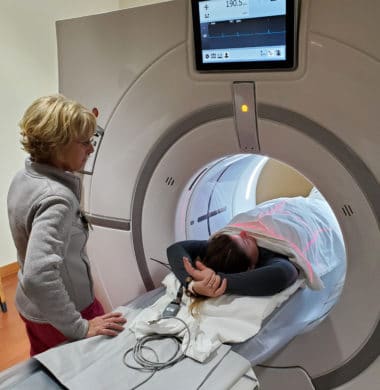When Should I Get a Heart Score Test?

Preventive cardiology involves doing many things to lower your risk of a heart attack. You are watching your diet and trying to get exercise. But are you doing enough?
One of the ways we can get an answer to that question is with a calcium heart score test, also known as a heart scan or coronary calcium scan. But when is the right time to get one of these scans? We’ll look at what the test does and talk about who benefits most from them to see if you should talk to a cardiologist about this diagnostic test.
What Is a Heart Score Test?
A heart score test is an advanced cardiology technique that uses CT scans to look for calcium buildup in the arteries of your heart. A CT scan is a special type of x-ray that takes multiple pictures from different perspectives to create a 3D model of your tissue. For the heart score test, we focus it on your heart. As with all x-rays, hard materials stand out on a CT scan. Since there are no bones in your heart, the CT scan will mostly be picking up on calcium deposits in your arteries.
Calcium can tell us how much buildup you have in your coronary arteries, which in turn tells us how likely it is that you’ll have a heart attack. This makes it a powerful test for helping us anticipate and prevent future heart attacks.
Who Benefits Most from a Heart Score Test?
A heart score test works best for people with a moderate or uncertain heart attack risk. For people with a low heart attack risk, it’s unlikely to give any useful information. Most likely, it will just tell us that we should keep doing preventive home care—no need for medications or other procedures at this point.
For people with a high heart attack risk, it will likely just tell us what we already know: you are at risk of a heart attack. We should continue the treatments you’re already on, including medications, diet, and a strict exercise program to help you stave off a heart attack.
But for many people, we’re not sure just how serious their heart attack risk might be. You might have some risk factors but not others. This makes it hard to recommend a treatment plan. We risk underestimating your heart attack risk and not doing enough or overestimating it and doing too much. A heart score test gives your cardiologist important information about your risk level so they can make a more informed opinion about which approach to take.
Is a Heart Score Test Right for You?
 So how do you know whether a heart score test is a right choice for you? First, consider factors in your heart attack risk, such as:
So how do you know whether a heart score test is a right choice for you? First, consider factors in your heart attack risk, such as:
- Age (40+ for women, 35+ for men)
- Smoking status (past or present smoker, level of smoking)
- Family history of heart disease
- Obesity
- Frequency and severity of exercise
- Related conditions like high cholesterol, diabetes, or high blood pressure
If you have a few of these risk factors, it might be time to get a heart score test to help you and your cardiologist make decisions about what level of preventive treatment is appropriate and likely to be effective.
Drawbacks of a Heart Score Test
A heart score test is not an absolute predictor of your heart attack risk. While most people develop arterial plaque with calcium, in some cases, people can get soft plaques that won’t show up on the scan. So, while a high heart score indicates heart attack risk, a low score doesn’t necessarily mean you have no risk.
It’s also important to note that a heart score test uses x-rays. Although the radiation level for this particular test is relatively low (about 1/10th as much as a full chest CT scan), it is not negligible. If you are undergoing other tests that expose you to radiation, you should talk to one of our cardiologists about your cumulative exposure.
Talk to a Cardiologist Today
Are you concerned about your heart health? Would you like to get more objective information to make informed decisions about how to protect yourself from a heart attack, stroke, or other cardiovascular problem? Advanced cardiology techniques at South Denver Cardiology can help.
Please call 303-744-1065 today or use our online form to schedule an appointment at South Denver Cardiology.
- Can I Shovel Snow with a Heart Condition? - March 18, 2024
- 6 Tips for Resuming Outdoor Exercise this Spring - March 11, 2024
- Early Signs of Heart Disease - February 26, 2024
Sign Up
As with any health concerns, your specific treatment program should be discussed thoroughly with your primary care physician as well as any specialists who may need to be consulted – like a cardiologist.
Sign Up
